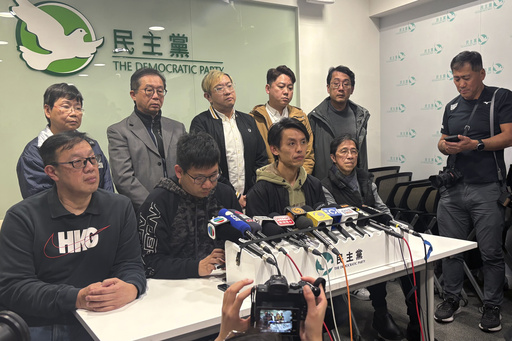
HONG KONG — In a significant development reflecting the diminishing space for civil society in Hong Kong, the territory’s largest pro-democracy group is moving towards potential dissolution. On Thursday, the central committee of the Democratic Party announced its intention to form a task force to examine the necessary procedures for this process. However, the final determination is contingent upon receiving input and approval from the party’s membership.
At a press briefing held late Thursday, Party Chairperson Lo Kin-hei explained that the decision was influenced by the current political landscape and societal conditions, clarifying that the party is not currently facing significant financial challenges. “It is regrettable that we have to consider this direction,” he stated, emphasizing that every party member values the Democratic Party’s presence in Hong Kong.
Established in 1994, the Democratic Party has long been one of the few remaining pro-democracy factions in a city that has experienced an aggressive crackdown on political dissent, particularly following the widespread protests in 2019 against the central government in Beijing. Among the notable figures within the party are Martin Lee, often called the “Father of Democracy” in the city, Albert Ho, who previously led a group organizing annual vigils for the Tiananmen Square massacre, and journalist and activist Emily Lau.
Historically, the Democratic Party has been viewed as a moderate opposition voice, even maintaining cordial interactions with Beijing officials in earlier years. Some past members transitioned into significant government roles, while others within the party criticized its moderate stance as overly cautious.
The political atmosphere shifted dramatically after the major protests in 2019 led to the implementation of a national security law in 2020, aimed at restoring stability, as per official claims. Consequently, numerous civil society organizations have closed down, which includes Hong Kong’s second-largest pro-democracy party and a well-established group known for its memorial vigil for the 1989 Tiananmen events. Leading activists faced prosecution under the new law, including individuals from the Democratic Party itself, while others opted for self-exile or faced suppression.
Last year, some former lawmakers from the Democratic Party received convictions and sentences connected to their involvement in an unofficial primary election related to a major national security case, which sparked international condemnation even as Beijing defended the legal outcomes.
Recent electoral reforms have severely limited the party’s influence in Hong Kong’s political scene, as the authorities restructured the electoral process to ensure that only “patriots” could govern, effectively excluding pro-democracy candidates from district council elections.
Despite these challenges, the party has persisted in its advocacy work, continuing to host press conferences on critical social issues and providing feedback on proposed national security regulations before they were enacted last March. During the Thursday press conference, Lo clarified that any decision to dissolve the party would necessitate a 75% majority from members present at a general assembly. Currently, the party comprises around 400 members, though attendance at general meetings tends to vary. Past efforts to amend the party’s constitution have seen mixed success in gathering sufficient votes.
When Hong Kong transitioned from British sovereignty to Chinese control in 1997, it was under the principle of “one country, two systems,” which was meant to safeguard certain civil liberties and levels of autonomy not recognized by residents in mainland China. Lo expressed that interpretations of this principle can differ, particularly from the view held by the Beijing government. He voiced a hope that various perspectives could coexist within society, asserting that diversity of thought contributes to societal progress.
“The journey towards democracy is inherently challenging,” Lo remarked. “I remain optimistic about the resilience of Hongkongers, who consistently find new ways to navigate complex issues.”

